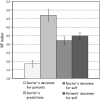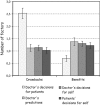On defensive decision making: how doctors make decisions for their patients
- PMID: 22646919
- PMCID: PMC5060905
- DOI: 10.1111/j.1369-7625.2012.00791.x
On defensive decision making: how doctors make decisions for their patients
Abstract
Background: In the past decade, the number of lawsuits for medical malpractice has risen significantly. This could affect the way doctors make decisions for their patients.
Objective: To investigate whether and why doctors practice defensive medicine with their patients.
Design: A questionnaire study was conducted in general practice departments of eight metropolitan hospitals in Spain, between January and February 2010.
Setting and participants: Eighty general practitioners (48% men; mean age 52 years) with an average of 15.3 years of experience and their 80 adult patients (42% men; mean age 56 years) participated in the study.
Main outcome measurements: Participants completed a self-administered questionnaire involving choices between a risky and a conservative treatment. One group of doctors made decisions for their patients. Another group of doctors predicted what their patients would decide for themselves. Finally, all doctors and patients made decisions for themselves and described the factors they thought influenced their decisions.
Results: Doctors selected much more conservative medical treatments for their patients than for themselves. Most notably, they did so even when they accurately predicted that the patients would select riskier treatments. When asked about the reasons for their decisions, most doctors (93%) reported fear of legal consequences.
Discussion and conclusions: Doctors' decisions for their patients are strongly influenced by concerns of possible legal consequences. Patients therefore cannot blindly follow their doctor's advice. Our study, however, suggests a plausible method that patients could use to get around this problem: They could simply ask their doctor what he or she would do in the patient's situation.
Keywords: conservative decision making; defensive medicine; medical decision making.
© 2012 John Wiley & Sons Ltd.
Figures


Similar articles
-
Retrospective study of doctors' "end of life decisions" in caring for mentally handicapped people in institutions in The Netherlands.BMJ. 1997 Jul 12;315(7100):88-91. doi: 10.1136/bmj.315.7100.88. BMJ. 1997. PMID: 9240047 Free PMC article.
-
Physicians' personal malpractice experiences are not related to defensive clinical practices.J Health Polit Policy Law. 1996 Summer;21(2):219-41. doi: 10.1215/03616878-21-2-219. J Health Polit Policy Law. 1996. PMID: 8723176
-
The practice of defensive medicine among hospital doctors in the United Kingdom.BMC Med Ethics. 2013 Oct 29;14:42. doi: 10.1186/1472-6939-14-42. BMC Med Ethics. 2013. PMID: 24168064 Free PMC article.
-
Does defensive medicine change the behaviors of vascular surgeons? A qualitative review.Biomed Res Int. 2015;2015:170692. doi: 10.1155/2015/170692. Epub 2015 Oct 1. Biomed Res Int. 2015. PMID: 26495285 Free PMC article. Review.
-
Gender matters, especially if you are a Polish teenager being examined by a doctor or a doctor examining a teenager.Eur J Pediatr. 2024 Dec;183(12):5129-5137. doi: 10.1007/s00431-024-05778-y. Epub 2024 Oct 19. Eur J Pediatr. 2024. PMID: 39425765 Free PMC article. Review.
Cited by
-
" The best interest of the adolescent " : Exploring doctors ' decision to proceed with treatment of sexual reproductive health without parental consent.Malays Fam Physician. 2019 Apr 30;14(1):35-41. eCollection 2019. Malays Fam Physician. 2019. PMID: 31289631 Free PMC article.
-
Cancer screening risk literacy of physicians in training: An experimental study.PLoS One. 2019 Jul 3;14(7):e0218821. doi: 10.1371/journal.pone.0218821. eCollection 2019. PLoS One. 2019. PMID: 31269051 Free PMC article.
-
Exploring How Accountability Affects the Medical Decisions We Make for Other People.Front Psychol. 2019 Feb 8;10:79. doi: 10.3389/fpsyg.2019.00079. eCollection 2019. Front Psychol. 2019. PMID: 30800081 Free PMC article.
-
How defensive medicine is defined in European medical literature: a systematic review.BMJ Open. 2022 Jan 20;12(1):e057169. doi: 10.1136/bmjopen-2021-057169. BMJ Open. 2022. PMID: 35058268 Free PMC article.
-
How defensive medicine is defined and understood in European medical literature: protocol for a systematic review.BMJ Open. 2020 Feb 28;10(2):e034300. doi: 10.1136/bmjopen-2019-034300. BMJ Open. 2020. PMID: 32114473 Free PMC article.
References
-
- Merenstein D . A piece of my mind: winners and losers . Journal of the American Medical Association , 2004. ; 291 : 15 – 16 . - PubMed
-
- Barry MJ . Screening for prostate cancer — the controversy that refuses to die . Journal of the American Medical Association , 2009. ; 360 : 1351 – 1354 . - PubMed
-
- Beisswanger AH , Stone ER , Hupp JM , Allgaier L . Risk taking in relationships: differences in deciding for oneself versus for a friend . Basic and Applied Social Psychology , 2003. ; 25 : 121 – 135 .
-
- Stone ER , Allgaier L . A social values analysis of self‐other differences in decision making involving risk . Basic and Applied Social Psychology , 2008. ; 30 : 114 – 129 .
-
- Wray LD , Stone ER . The role of self‐esteem and anxiety in decision making for self versus others in relationships . Journal of Behavioral Decision Making , 2005. ; 18 : 125 – 144 .
Publication types
MeSH terms
LinkOut - more resources
Full Text Sources
Miscellaneous

